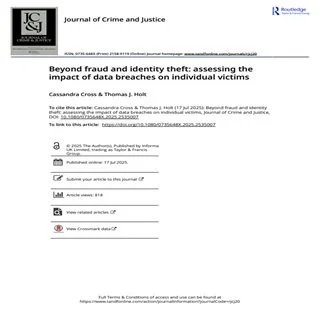By Cassandra Cross, Thomas Holt
Data breaches, or the unauthorized access of personal information, are increasing globally as are the number of victims affected. Existing studies restrict their focus on fraud and identity theft as principal consequences of data breaches for individuals, limiting our knowledge of the extent of other harms associated with victimisation. This article assesses the impacts of third-party data breaches within a sample of 552 Australian victims. The findings note specific behavioural factors and data losses were associated with emotional, health, relationship, and financial harms. This article advocates recognition of data breach impacts beyond the financial losses of fraud and identity crime, and expanding support offered to victims in response to such incidents.
Journal of Crime and Justice, 1–24
By Anthony Morgan and Isabella Voce
This paper draws on data from a large national survey conducted in 2021 to examine the prevalence of data breaches among Australian computer users and the relationship between data breaches and other forms of cybercrime victimisation. Almost one in 10 respondents (9.3%) said they were notified their information was exposed in a data breach in the 12 months prior to the survey. Nearly one-third of these respondents (28.0%) had also been a victim of identity crime in the same period. Respondents who had been notified of a data breach were 34 percent more likely than other respondents to have been a victim of identity crime in the 12 months prior to the survey. They were also more likely to have been a victim of online scams or fraud and ransomware. Measures to protect individuals whose information has been exposed in a data breach from other potentially related cybercrimes are essential and should be prioritised when data breaches occur.
Statistical Bulletin no. 40. Canberra: Australian Institute of Criminology. 2022. 16p.



